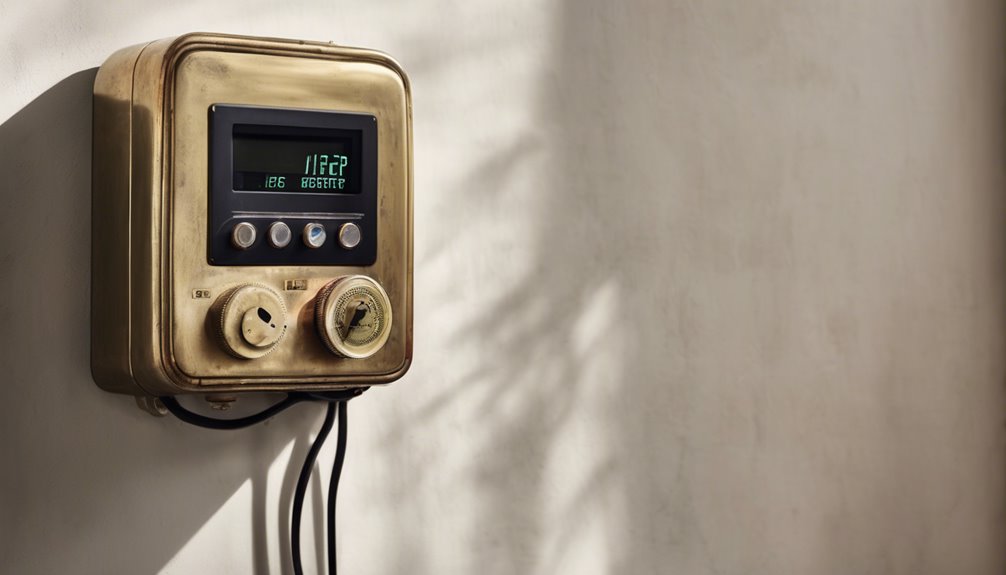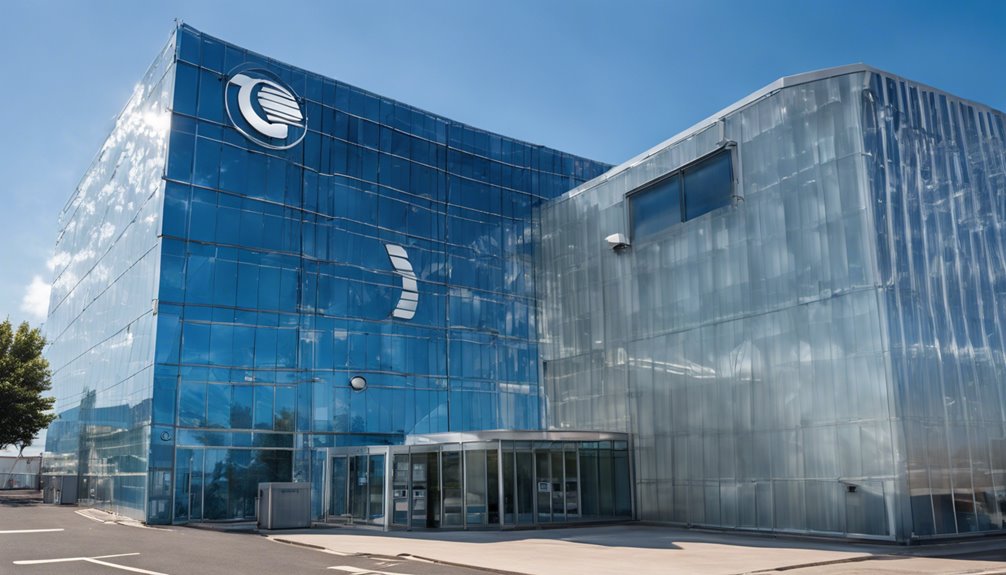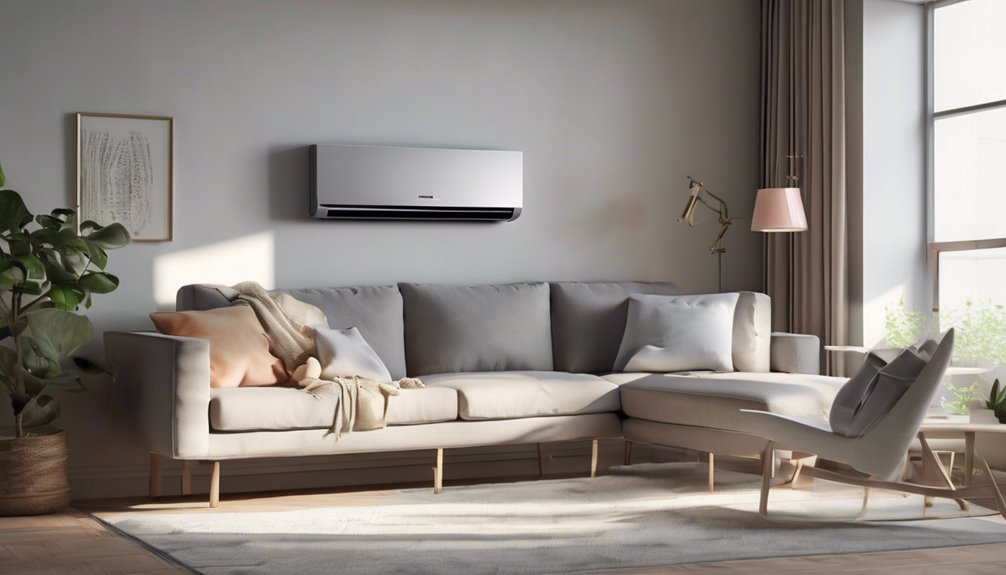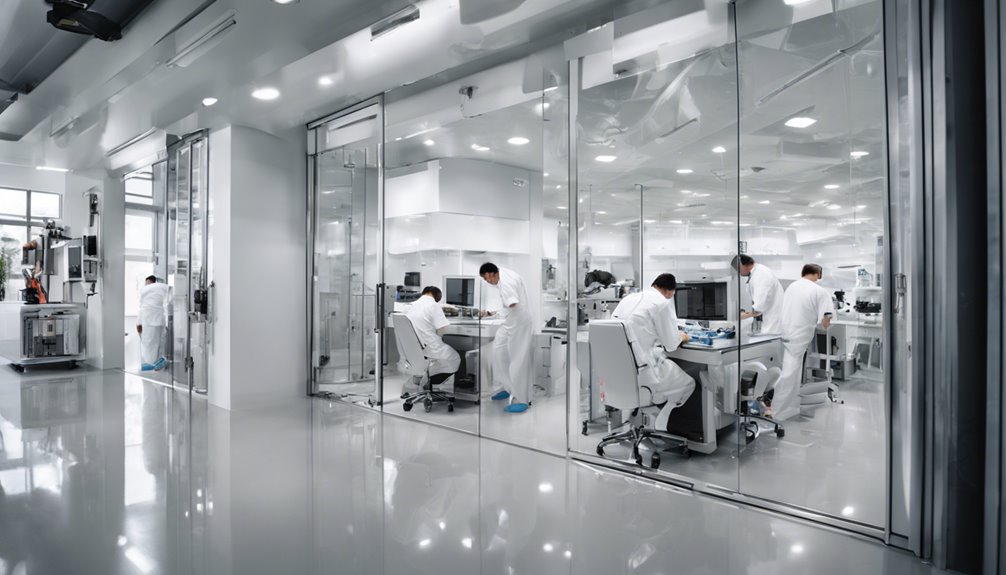You're wondering if inverter ACs really save electricity? The answer is yes! By adjusting compressor speed according to cooling demands, inverter ACs can trim your electricity bill by up to 30% compared to traditional ACs. This smart technology ensures the compressor doesn't consume more power than necessary, resulting in significant energy savings. Want to know more about how inverter ACs work their magic and what factors affect their efficiency?
Key Takeaways
- Inverter ACs save energy by adjusting compressor speed according to cooling demand, resulting in significant energy savings.
- They optimize motor performance, reducing energy waste and prolonging motor lifespan, which leads to energy efficiency.
- Inverter ACs reduce energy consumption by up to 30% compared to traditional ACs, especially when operating at partial loads.
- Smart energy management and real-time monitoring enable optimization of energy consumption and identification of areas of high energy usage.
- Proper installation, maintenance, and sizing are crucial to reap the energy-saving benefits of inverter ACs.
How Traditional ACs Work
Traditional air conditioners rely on a fundamental principle: alternating current (AC) electricity.
You see, they're designed to convert AC power from your wall outlet into cool air.
The cooling basics are simple: the AC unit absorbs heat from your room and releases it outside.
Cooling 101: AC units absorb heat from your room, releasing it outside for a refreshing indoor climate.
This process involves air circulation, where a fan blows hot air over a coil, cooling it down.
The cooled air is then blown back into your room, making you feel comfortable.
As the compressor pumps refrigerant through the system, it expands and contracts, allowing heat to be transferred.
This continuous cycle ensures your room stays cool and cozy.
The Inverter Technology Advantage
You're about to experience the benefits of inverter technology, which revolutionizes the way your AC operates.
With efficient compressor operation, your AC can adjust its power consumption in real-time to match your cooling needs.
This smart energy management system ensures you enjoy consistent comfort while slashing your energy bills.
Efficient Compressor Operation
One of the most significant advantages of inverter AC technology lies in its efficient compressor operation.
You'll experience significant energy savings due to the compressor's ability to adjust its speed according to the cooling demand. This compressor optimization ensures that the AC doesn't waste energy by running at full capacity when it's not needed.
Inverter technology allows for energy harvesting, where the AC can store excess energy and use it when needed, reducing the load on the compressor. This results in lower energy consumption and a significant reduction in your electricity bill.
Smart Energy Management
As you enjoy the energy savings from efficient compressor operation, you'll appreciate the additional benefits of smart energy management, a hallmark of inverter technology. This advanced technology allows for real-time energy monitoring, enabling you to optimize your energy consumption and reduce waste. With smart energy management, you can identify areas of high energy usage and make adjustments to minimize your carbon footprint.
| Feature | Benefit |
|---|---|
| Real-time Energy Monitoring | Optimizes energy consumption and reduces waste |
| Smart Grid Integration | Enables efficient energy distribution and consumption |
| Energy Usage Tracking | Identifies areas of high energy usage for optimization |
| Automated Energy Control | Adjusts energy consumption based on usage patterns |
| Remote Energy Management | Allows for monitoring and control from anywhere |
Variable Speed and Energy Efficiency
The variable speed feature of inverter ACs revolutionizes the way air conditioning systems consume electricity.
You get to enjoy a more efficient cooling experience, thanks to the ability of the inverter AC to adjust its speed according to the cooling demand. This feature ensures that the AC motor doesn't consume more power than necessary, resulting in significant energy savings.
- Optimized motor performance: The inverter AC's speed regulation ensures the motor operates within its optimal range, reducing energy waste and prolonging its lifespan.
- Improved speed regulation: The AC adjusts its speed to match the cooling demand, reducing energy consumption and minimizing wear and tear on the motor.
- Enhanced motor optimization: The inverter AC's advanced motor optimization techniques ensure the motor operates at its most efficient level, resulting in maximum energy savings.
- Increased energy efficiency: By reducing energy waste and optimizing motor performance, you can enjoy significant energy savings and a lower electricity bill.
Cooling Capacity and Power Consumption
When you're shopping for an inverter AC, you're likely to come across terms like "cooling capacity" and "power consumption".
You might wonder what these terms really mean and how they impact your AC's performance.
Understanding these concepts is crucial to choosing the right inverter AC for your needs and saving energy in the long run.
Cooling Capacity Matters
Most households require at least 1 ton of cooling capacity to maintain a comfortable temperature during peak summer months.
However, you mightn't know that your AC's cooling capacity directly affects its power consumption.
To determine the right capacity for your home, you need to consider factors like room size, insulation, and the number of occupants.
- Conduct capacity testing to identify your cooling requirements.
- Consider the room's dimensions, as a larger room requires a higher cooling capacity.
- Insulation and window size also impact your cooling needs.
- Don't forget to factor in the number of people occupying the room, as more people generate more heat.
Power Consumption Patterns
Your AC's cooling capacity has a direct impact on its power consumption, and understanding this relationship is crucial for optimizing your energy usage.
During peak hours, your AC's power consumption peaks, and its energy profile changes.
Inverter ACs are designed to adjust their compressor speed according to the cooling demand, which affects their power consumption patterns.
For instance, if you're cooling a small room, the inverter AC will consume less power compared to a larger room that requires more cooling.
Understanding these patterns is essential to make the most of your inverter AC's energy-saving capabilities.
Comparing Energy Efficiency Ratings
Comparing energy efficiency ratings is crucial to understanding how well an inverter AC unit can minimize your electricity bills.
Understanding an inverter AC's energy efficiency rating is key to slashing your electricity bills.
You need to know how to evaluate these ratings to make an informed decision.
Look for Energy Labels and Star Ratings, which indicate the AC's energy efficiency.
- Check the number of stars: A higher rating means the AC is more energy-efficient.
- Understand the energy consumption categories: These range from A+++ (most efficient) to D (least efficient).
- Consider the AC's wattage: A lower wattage means lower energy consumption.
- Research the testing standards: Ensure the ratings are based on standardized testing procedures.
Real-World Energy Savings
About 40% of your electricity bill is attributed to air conditioning, making it a significant expense.
You're probably wondering if investing in an inverter AC will really help reduce your energy consumption. The good news is that it can lead to real savings.
Studies have shown that inverter ACs can lower your energy consumption by up to 30% compared to traditional ACs. This is because they adjust their compressor speed according to the room's temperature, using less power when it's not needed.
In the long run, this can translate to substantial real savings on your electricity bill. By switching to an inverter AC, you can enjoy a cooler home while keeping your energy costs in check.
Factors Affecting Inverter AC Efficiency
While enjoying the energy savings from your new inverter AC, it's also important to understand that its efficiency can be influenced by several factors.
These factors can either enhance or diminish the benefits you're expecting from your inverter AC.
- Proper load calculation is crucial to ensure your inverter AC is sized correctly for your space.
- Energy audits can help identify areas of energy inefficiency in your home or office.
- The type and quality of the inverter AC unit itself also play a significant role in its efficiency.
- Additionally, regular maintenance and cleaning of the AC's filters and coils can greatly impact its performance.
Debunking Common Misconceptions
As you delve deeper into the world of inverter AC technology, you may come across various myths and misconceptions that can affect your purchasing decision or overall experience.
It's essential to separate fact from fiction through myth busting. One common energy myth is that inverter ACs are only suitable for small rooms.
However, this isn't true – inverter ACs can efficiently cool larger spaces too. Another myth is that inverter ACs are slow to cool.
In reality, they can cool faster and more efficiently than traditional ACs. By debunking these myths, you can make an informed decision when choosing an inverter AC that suits your needs.
The Verdict: Do Inverter ACs Really Save Electricity?
So, do inverter ACs really save electricity?
After debunking common Energy Myths and AC Hype, it's time to give you a straightforward answer.
The truth is, inverter ACs can save you a significant amount of energy, but only under certain conditions.
- Inverter ACs are most efficient when operating at partial loads, which is usually the case in most homes.
- They can reduce energy consumption by up to 30% compared to traditional ACs.
However, their energy-saving capabilities are reduced when operating at full load or in extremely hot temperatures.
– Proper installation, maintenance, and sizing are crucial to reap the energy-saving benefits of inverter ACs.
Frequently Asked Questions
Can I Install an Inverter AC in a Room With Low Ceiling Height?
You can install an inverter AC in a room with low ceiling height, but you'll face ceiling constraints and installation challenges, requiring careful planning and possibly custom ductwork to ensure proper airflow and efficient performance.
Do Inverter ACS Require More Maintenance Than Traditional ACS?
You'll find that inverter ACs require less maintenance than traditional ones, as they have fewer moving parts. However, you'll still need to clean the filter regularly to ensure optimal performance, and Inverter reliability depends on it.
Can I Use an Inverter AC With a Voltage Stabilizer?
You're wondering if you can pair an inverter AC with a voltage stabilizer. Yes, you can, but ensure the stabilizer is compatible with the inverter's technology to handle power fluctuations smoothly and efficiently.
Do Inverter ACS Work Well in Areas With Frequent Power Outages?
You'll be happy to know that inverter ACs can handle frequent power outages, but you'll need a reliable power backup system to ensure seamless operation, especially if outage frequency is high in your area.
Can I Install an Inverter AC in a Room With No Windows?
You can install an inverter AC in a room with no windows, but consider the room layout and ensure proper air circulation for efficient cooling. Natural ventilation is crucial, so look for other ventilation sources or consider installing an exhaust fan.
Conclusion
You've made it to the end of our in-depth exploration of inverter ACs and their electricity-saving claims. So, do they really deliver? The answer is a resounding yes! Inverter ACs outperform traditional ACs in terms of energy efficiency, thanks to their advanced technology and variable speed compressors. While factors like usage and maintenance affect their efficiency, inverter ACs can help you cut down on your electricity bills. Make the switch and start saving today!



